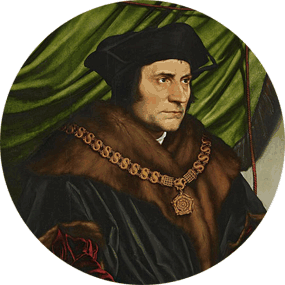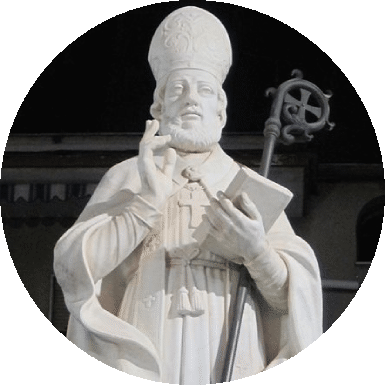22 June
Optional Memorial
St. John Fisher (1469-1535) and St. Thomas More (1478-1535)
John Fisher studied Theology in Cambridge (England) and became Bishop of Rochester. His friend, Thomas More, wrote of him, ‘I reckon in this realm no one man, in wisdom, learning and long approved virtue together, meet to be matched and compared with him.’ Thomas More was born in London, England and was Chancellor of King Henry VIII. As a family man and a public servant, his life was a rare synthesis of human sensitivity and Christian wisdom. They gave up their lives in testimony to the unity of the Church and to the indissolubility of Marriage.
St. Paulinus of Nola (354-431 AD)
Was born of a patrician Roman family at Bordeaux. He was successively prefect, senator and consul. His wife, wishing to consecrate herself to God, gave up rank and riches; he followed her example and went to live an austere hermit’s life at Nola in Italy. There he became a priest and then bishop of the city, and gave his people not only an example of virtue but also wise guidance during the ravages and calamities of the Gothic invasion. He died in 431, aged 78, and was buried at Nola near the tomb of St. Felix.

Feast Day: 22 June
St. John Fisher (1469-1535)
Martyr, Cardinal of England
Born: 1469, Beverley, Yorkshire, England
Died: 22 June 1535, Tower Hill, London, England
Canonized: 19 May 1935, Rome by Pope Pius XI
Patron: Those persecuted for the Faith
St. John Fisher studied Theology in Cambridge (England) and became Bishop of Rochester. His friend, Thomas More, wrote of him, ‘I reckon in this realm no one man, in wisdom, learning and long approved virtue together, meet to be matched and compared with him.’ He and his friend St. Thomas More gave up their lives in testimony to the unity of the Church and to the indissolubility of Marriage.
COLLECT PRAYER
O God, who in martyrdom have brought true faith to its highest expression, graciously grant that, strengthened through the intercession of Saints John Fisher and Thomas More, we may confirm by the witness of our life the faith we profess with our lips. Through our Lord Jesus Christ, your Son, who lives and reigns with you in the unity of the Holy Spirit, God, for ever and ever.
Things to Do:
- Read more about St. John Fisher.
- Exposition of the Seven Penitential Psalms is available from Amazon.
St. John Fisher
John Fisher is usually associated with Erasmus, Thomas More and other Renaissance humanists. His life, therefore, did not have the external simplicity found in the lives of some saints. Rather, he was a man of learning, associated with the intellectuals and political leaders of his day. He was interested in the contemporary culture and eventually became chancellor at Cambridge. He had been made a bishop at thirty-five, and one of his interests was raising the standard of preaching in England. Fisher himself was an accomplished preacher and writer. His sermons on the penitential psalms were reprinted seven times before his death. With the coming of Lutheranism, he was drawn into controversy. His eight books against heresy gave him a leading position among European theologians.
In 1521 he was asked to study the problem of Henry VIII’s marriage. He incurred Henry’s anger by defending the validity of the king’s marriage with Catherine and later by rejecting Henry’s claim to be the supreme head of the Church of England.
In an attempt to be rid of him, Henry first had him accused of not reporting all the “revelations” of the nun of Kent, Elizabeth Barton. John was summoned, in feeble health, to take the oath to the new Act of Succession. He and Thomas More refused because the Act presumed the legality of Henry’s divorce and his claim to be head of the English church. They were sent to the Tower of London, where Fisher remained fourteen months without trial. They were finally sentenced to life imprisonment and loss of goods.
When the two were called to further interrogations, they remained silent. Fisher was tricked, on the supposition he was speaking privately as a priest, and declared again that the king was not supreme head. The king, further angered that the pope had made John Fisher a cardinal, had him brought to trial on the charge of high treason. He was condemned and executed, his body left to lie all day on the scaffold and his head hung on London Bridge. More was executed two weeks later.
Excerpted from Saint of the Day, Leonard Foley, O.F.M.
Source: Catholic Culture & EWTN.com

Feast Day: 22 June
St. Thomas More (1478-1535)
Martyr, Chancellor of England
Born: 1478 at London, England
Died: 6 July 1535, London, England
Canonized: 1935, Rome by Pope Pius XI
Patron of: Adopted children,civil servants, court clerks, difficult marriages, large families, lawyers, politicians and statesmen, stepparents, widowers
St. Thomas More was born in London, England and was Chancellor of King Henry VIII. As a family man and a public servant, his life was a rare synthesis of human sensitivity and Christian wisdom.
COLLECT PRAYER
O God, who in martyrdom have brought true faith to its highest expression, graciously grant that, strengthened through the intercession of Saints John Fisher and Thomas More, we may confirm by the witness of our life the faith we profess with our lips. Through our Lord Jesus Christ, your Son, who lives and reigns with you in the unity of the Holy Spirit, God, for ever and ever.
Things to Do:
- If you haven’t watched or read it yet, put it on your priority list: A Man for All Seasons by Robert Bolt is a wonderful play that captures much of St. Thomas More’s vitality. There is a 1966 movie by the same title that stars Paul Scofield as St. Thomas. A definite must see!
- Read more on the life of St. Thomas More. For youth, Saint Thomas More of London by Elizabeth Ince, a reprint of the wonderful Vision Books series. For adults, the newer book The King’s Good Servant but God’s First : The Life and Writings of Saint Thomas More by James Monti which explores the life and writings of St. Thomas More. Also Scepter Publishers has a biography Thomas More: A Portrait of Courage by Gerard B. Wegemer.
- For some writings by St. Thomas More, see The Sadness of Christ (Yale University Press Translation) and Four Last Things: The Supplication of Souls: A Dialogue on Conscience.
- If you or your children are considering a career as a lawyer you might find Dr. Charles Rice’s article helpful.
St. Thomas More
His belief that no lay ruler has jurisdiction over the church of Christ cost Thomas More his life.
Beheaded on Tower Hill, London, July 6, 1535, he steadfastly refused to approve Henry VIII’s divorce and remarriage and establishment of the Church of England.
Described as “a man for all seasons,” More was a literary scholar, eminent lawyer, gentleman, father of four children and chancellor of England. An intensely spiritual man, he would not support the king’s divorce from Catherine of Aragon in order to marry Anne Boleyn. Nor would he acknowledge Henry as supreme head of the church in England, breaking with Rome and denying the pope as head.
More was committed to the Tower of London to await trial for treason: not swearing to the Act of Succession and the Oath of Supremacy. Upon conviction, More declared he had all the councils of Christendom and not just the council of one realm to support him in the decision of his conscience.
Four hundred years later, in 1935, Thomas More was canonized a saint of God. Few saints are more relevant to our time. In fact, in 2000, Pope John Paul II named him patron of political leaders. The supreme diplomat and counselor, Thomas More did not compromise his own moral values in order to please the king, knowing that true allegiance to authority is not blind acceptance of everything that authority wants. Henry himself realized this and tried desperately to win his chancellor to his side because he knew More was a man whose approval counted, a man whose personal integrity no one questioned. But when Thomas resigned as chancellor, unable to approve the two matters that meant most to Henry, the king felt he had to get rid of Thomas.
Excerpted from Saint of the Day, Leonard Foley, O.F.M.
Source: Catholic Culture
For another account, see: EWTN.com

Feast Day: 22 June
St. Paulinus of Nola (354-431 AD)
Bishop, Confessor, Writer
Born 22 June 354
Bordeaux, Gallia Aquitania, western Roman Empire
Died 22 June 431 (aged 76–77)
Nola in Campania, the Praetorian prefecture of Italy, Western Roman Empire
Venerated in
Anglican Communion
Catholic Church
Eastern Orthodox Church
Oriental Orthodox Churches
Feast
Anglican tradition: 22 June (memorial)
Catholicism: 22 June
Eastern Orthodoxy: 23 January; and 22 June
Oriental Orthodox Churches: 8 September
COLLECT PRAYER
O God who the Bishop Saint Paulinus of Nola outstanding for love of poverty and for pastoral care, graciously grant that, as we celebrate his merits, we may imitate the example of his charity. Through our Lord Jesus Christ, your Son, who lives and reigns with you in the unity of the Holy Spirit, God, for ever and ever.
Highlights and Things to Do:
- Read more about St. Paulinus:
- See which churches in Rome honor St. Paulinus at Saints In Rome & Beyond.
- Read Pope Benedict’s General Audience Address on Saint Paulinus of Nola.
In 353 Pontius Meropius Anicius Paulinus was born of a prominent Bordeaux family. He received his education in the school of the rhetorician Ausonius. At an early age he attained the dignity of senator and then of consul. As governor of Campania, he chose Nola as his seat. Here he was converted to the faith by St. Felix of Nola. He resigned his position and returned to Gaul, where St. Martin of Tours restored his eyesight.
Despite personal remonstrances, Paulinus was ordained a priest in Spain, and from there he returned to do honor at the grave of his sainted spiritual father. In 409 he became bishop of Tours. Paulinus was an author and poet; he corresponded with the great saints and scholars of his time, Ambrose and Augustine. During the Vandal invasion he used every possible means to feed the poor. When a poor widow asked for money to ransom her son, he gave himself into slavery. With God’s aid he returned to his flock and died at the age of seventy-eight in 431. His last words were: “I will prepare a lamp for My anointed” (Ps. 131). His particular virtue was love toward the poor.
—Excerpted from The Church’s Year of Grace, Pius Parsch
Source: CATHOLIC CULTURE